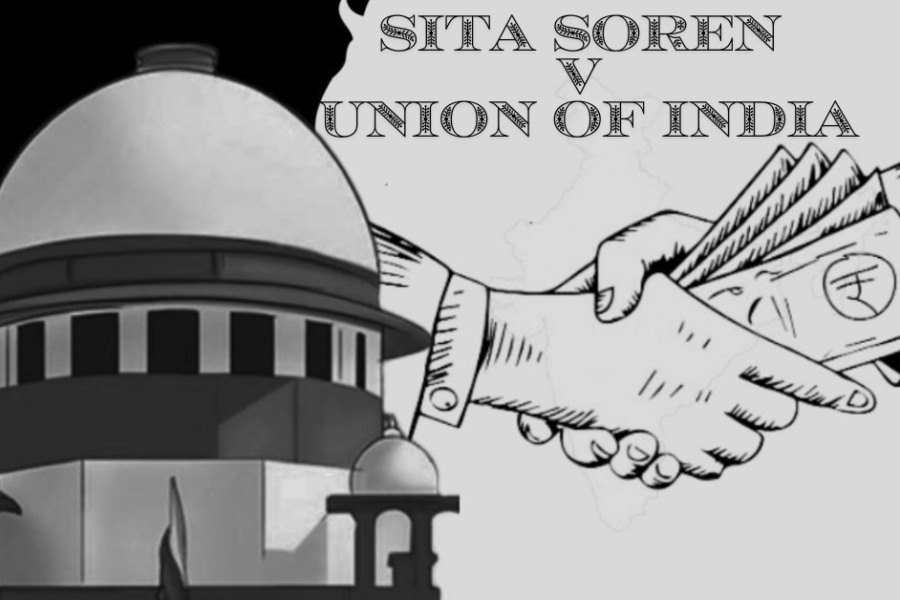Introduction
In a landmark unanimous decision on March 4, 2024, a seven-judge Constitution Bench of the Supreme Court ruled that lawmakers do not enjoy parliamentary immunity or privilege against charges of bribery. The judgement in Sita Soren v Union of India overruled a controversial 1998 precedent and firmly established that the constitutional protections for free speech in Parliament cannot be twisted into a license for corrupt practices.
The case had raised fundamental questions about the sanctity of the legislative process and whether MPs and MLAs could claim immunity even if they accepted bribes to influence their votes. After a journey spanning over a decade that saw the matter being examined by Constitution Benches of increasing strength, the Supreme Court has emphatically closed the door on such claims of immunity.
Background
The issue began in 2012 when Sita Soren, a member of the Jharkhand Legislative Assembly from the Jharkhand Mukti Morcha (JMM) party, was accused of accepting a bribe of Rs. 4 crore from an independent candidate during the Rajya Sabha elections. The allegation was that she had been bribed to cross-vote in favor of the independent candidate, but she ultimately cast her vote for JMM’s official candidate instead.
Soren approached the Jharkhand High Court seeking to quash the corruption charges against her. She relied on Article 194(2) of the Constitution, which extends parliamentary privileges to members of state legislatures, parallel to Article 105(2) for MPs.
Soren argued that her vote in the Assembly was protected under these provisions which grant immunity for anything said or any vote cast.
The High Court rejected her claims, distinguishing her situation from the controversial 1998 Supreme Court precedent in P.V. Narasimha Rao v State. In that case involving bribery allegations against the former Prime Minister during a no-confidence motion in 1993, a 3:2 majority had ruled that lawmakers enjoyed blanket immunity for their speech and votes cast, as long as there was a nexus between the bribery and the parliamentary act.
The Jharkhand High Court held that since Soren had not voted as per the conditions of the alleged bribe, the nexus was broken, and she could not claim immunity under Article 194(2).
Case in Supreme Court
Soren’s appeal against the High Court order made its way to the Supreme Court in 2014. Over the next few years, the case was referred from smaller Benches to larger Constitution Benches as the Court grappled with the “wide ramifications” of revisiting the Narasimha Rao precedent.
After a three-judge Bench in 2019 referred it to a five-judge Constitution Bench, the latter in September 2023 opted to send it to a seven-judge Bench – larger than the five-judge strength that had decided Narasimha Rao earlier.
During the extensive hearings in October 2023, Soren’s lawyers insisted the Narasimha Rao judgement was “well-reasoned” and granted MLAs “absolute protection” for acts in the legislature. However, the respondents and intervenors argued that extending this immunity to bribery would be an “undemocratic” travesty of justice.
The Constitutional Bench’s Verdict
Delivering the landmark 145-page verdict penned by Chief Justice D.Y. Chandrachud, the seven-judge Bench unanimously ruled that lawmakers cannot claim immunity under Articles 105(2) and 194(2) for accepting bribes in exchange for influencing their speech or votes in the legislature.
The Bench overruled the majority ruling in Narasimha Rao, terming it “legally incorrect.” CJI Chandrachud wrote that the minority view which had denied blanket immunity in that case represented the “correct constitutional position.”
The Court laid down a two-pronged test to determine if an act qualifies for parliamentary privilege.
- Firstly, the act must be an integral part of parliamentary proceedings and practices.
- Secondly, the alleged offense must not impinge on the broader public interest in prohibiting unlawful conduct.
Unequivocally, the judges stated: “The bribery of legislators is a deep immorality and illegality which strikes at the foundations of democratic and Parliamentary decision-making process.” Such conduct could never deserve constitutional protection simply because it was committed in the course of parliamentary duties.
Significance of the Verdict
The decision in Sita Soren represents a decisive reinstatement of the foundational principles of parliamentary democracy and the constitutional morality that governs public representatives. It marks an authoritative repudiation of the notion that legislators could hide behind parliamentary privilege to indulge in the “deep immorality and illegality” of bribery.
As the Court noted, if MPs and MLAs were granted immunity for corrupt practices aimed at subverting the very essence of democratic decision-making, it would “legitimize a criminal act in exchange of the constitutional protections.” This would fundamentally erode public trust in democratic institutions.
The clear jurisprudential line drawn by the seven-judge Bench leaves no ambiguity that while free speech in Parliament must be robustly protected as the lifeblood of democracy, that privilege cannot extend to bribery or other unlawful acts that undermine that very democracy.
The ruling in Sita Soren marks a decisive course correction from the detour the Supreme Court had taken in Narasimha Rao over two decades ago. By overturning that flawed precedent and unambiguously denying constitutional immunity to lawmakers accused of the “deep immorality” of accepting bribes, the Bench has tried to reinforce the primacy of constitutional morality over individual privileges in India’s parliamentary democracy.
Contributed by-
Saachi Minocha
National Law University, Jodhpur (2023-28)

